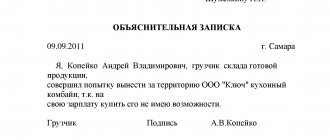Grounds for appeal
Dismissal is considered unlawful when the director violated the procedure for terminating a contract with an employee or did so without legal grounds. As a rule, a corresponding entry is made in the work book, which in the future may prevent you from getting a new position.
Photo: geralt/pixabay.com
If an employee does not agree with management’s decision, he has the right to challenge it to higher authorities.
In accordance with Article 81 of the Labor Code of the Russian Federation, the manager may terminate cooperation unilaterally if the employee, without good reason:
- absenteeism (absent for more than 4 hours in a row during one shift);
- repeatedly failed to fulfill his duties;
- grossly violated discipline;
- did not pass the certification, as a result of which he was declared unsuitable for the position held;
- appeared under the influence of alcohol or drugs;
- disclosed state or commercial secrets;
- stole or intentionally destroyed someone else's or official property;
- violated labor safety requirements, resulting in a disaster or accident;
- committed illegal actions with money or other valuables, which led to the loss of management’s trust;
- did not provide information about his income, spouse and minor children (for civil servants - Law No. 79-FZ of 05/07/2013);
- committed an immoral act (for employees performing educational functions);
- provided false documents or false information when concluding a contract.
In order to deprive a person of work, you need to collect strong arguments, back them up with facts and record them with an act of drunkenness or truancy, a court decision about theft, etc. When such documents are not available, then the termination of the employment contract is considered unlawful.
Attention! Even if there are serious reasons, it is prohibited to dismiss employees during sick leave, while on annual or maternity leave, pregnant women and single mothers. When an organization is liquidated, the director must offer them another job as a matter of priority.
Another reason for appeal may be termination of cooperation due to staff reduction or liquidation of the enterprise. According to the Labor Code of the Russian Federation, the director is obliged to notify employees in writing about the upcoming changes 2 months in advance, because they need to find a new place. If the manager did not report this and suddenly removed people from the staff under the article, then such dismissal is also considered illegal and subject to challenge.
Photo: geralt/pixabay.com
In some cases, the employer, for example during reorganization, conducts certification to identify qualified specialists, based on the results of which it determines who will remain at the enterprise. Sometimes the manager, in order to get rid of unwanted employees, does not allow them to take the exam, but immediately sends them to layoff. Such an action is also unacceptable - everyone must participate in the certification, because everyone has the right to show their knowledge. And if an employee is dismissed as having failed the test without being allowed to participate, he can complain against the director to the State Labor Inspectorate or the court.
The reason for contacting higher authorities will be dismissal without completing the necessary documents. For example, it is impossible to remove an employee at his own request without him writing a statement. And when there is a legal reason for termination of cooperation, it is necessary to familiarize the citizen with the relevant order. If all these rules are not followed, then you can safely file a complaint.
What is considered illegal dismissal?
Illegal termination of an employment contract implies a violation of the employee’s rights by the employer.
Labor relations are terminated without compelling reasons and, most importantly, without legal grounds. The preparation of documents occurs with various violations. Some documents are not prepared at all. As, for example, an explanatory note that serves as the basis for a memo with the subsequent issuance of an order.
Since each individual situation is unique in its own way, the employee must independently take care of collecting evidence of the violation and witness testimony. In some particularly complex cases, timely consultation and assistance from an independent lawyer would be appropriate. This specialist will competently draw up a statement of claim and fully support the injured employee during the trial.
In most cases, the emphasis is on proving the absence of any document or action on the part of management or a gross violation of the procedure.
It should be remembered that the claim is filed only within one month from the date of issuance of the order or the day the work book is issued to the employee. The consideration of the case also takes no more than one month. In this case, the adopted court decision is subject to immediate execution. This rule applies, first of all, to reinstatement of a job lost by an employee.
Where to dispute
However, sometimes a letter of complaint addressed to the director with a request to rectify the situation with references to violated laws is sufficient.
And if the enterprise has a trade union, then it should be remembered that any member of this public organization cannot be fired without the consent of the chairman. Its competence includes considering complaints from illegally dismissed employees and appealing to regulatory authorities. If the issue cannot be resolved within the enterprise, then they seek justice in higher authorities.
Via GIT
To file a complaint with the inspectorate, the applicant must prepare the following documents:
- statement;
- contract;
- work book;
- a copy of the dismissal order (if you can get it);
- passport.
In general, any papers that can confirm the fact of illegal dismissal will be useful. They must be submitted within 30 days from the date of termination of cooperation.
Photo: StartupStockPhotos/ pixabay.com
The application is drawn up in free form. The main thing is to provide the required information:
- name of the organization where the citizen worked;
- FULL NAME. the dismissed person, his position, structural unit;
- contract details (number and date of preparation).
The content consistently describes the current situation, the dismissal process, the employer’s violations, as well as the requirements for him to be reinstated and (or) pay the required compensation. When compiling the text, reference is made to articles of law or regulations.
Submit documents to the inspectorate at the location of the organization. If it is not possible to bring them in person, then they are sent by registered mail or electronically on the GIT website. If submitted through a representative, a power of attorney certified by a notary is attached to the documents.
The time frame for consideration of a complaint is 10 days from the date of receipt of documents; based on the results of the inspection, a response is prepared to the applicant.
You can complain to the prosecutor's office in a similar way. Having received the documents, department employees are obliged to conduct an inspection and restore justice.
Through the court
You can skip the stages of challenging the case with government agencies and go straight to the district court at the place of registration of the defendant or applicant. If it is necessary to recover moral damages, the labor inspectorate is not authorized to make such decisions, as well as to question witnesses. In court there is a greater likelihood of proving the director's guilt. The only negative is the length of the trial.
Attention! According to Article 393 of the Labor Code of the Russian Federation, a citizen who is forced to resolve a dispute with the director in court is exempt from paying state fees and other procedural expenses, for example, handwriting examination.
An employment contract is suitable for confirmation. If the manager delayed signing and did not give it to the employee, then the evidence base will be:
- SMS messages;
- electronic correspondence;
- opinion of witnesses;
- telephone conversations;
- audio and video recordings;
- other documentation held by the plaintiff.
Photo: Jupiterimages/ picspree.com
In the demanding part, the applicant may request:
- invalidate the order;
- to reinstate;
- recover compensation for moral damage.
Copies of the contract, orders, work book and other documents or materials on the case are attached to the statement of claim. For example, if a person was fired while on sick leave, it is important to attach a certificate of incapacity for work.
Send documents:
- personally;
- by mail (registered mail);
- electronically on the State Services portal, on the official website of the court (if the body is technically equipped);
- through a representative with a higher legal education (attach a copy of the diploma) with a notarized power of attorney.
The deadline for submitting documents is 30 days from the moment the employee familiarizes himself with the order (Article 392 of the Labor Code of the Russian Federation). However, they can be extended by proving that the employee learned about the dismissal much later. Or confirm that you did not have time to file a claim within the prescribed period for a valid reason: illness, business trips, caring for seriously ill relatives and other force majeure circumstances.
The court hearing lasts about a month, but sometimes it can take longer. The secretaries inform about the exact date of the meeting.
Where is the claim filed?
When resolving labor disputes in court, the general rule of jurisdiction applies, according to which the claim must be filed at the location of the defendant - in this case, the organization from which the specialist was illegally fired. This follows directly from Art. 28 Code of Civil Procedure of the Russian Federation.
However, the legislator has provided an alternative option, according to which the former employee has the right to appeal to the court located geographically at his place of residence. This option is convenient for those whose place of work is in another city.
It should also be noted that the district (or city) court should consider the claim.
Magistrates do not resolve labor disputes regarding reinstatement.
Reinstatement
If the employer’s actions are declared illegal, then he will be obliged to rehabilitate the dismissed person. The GIT inspector or the bailiff will send an order to the manager, on the basis of which the personnel department must create an order declaring the dismissal unlawful. After this, the employee returns to his duties at his previous place.
Reinstatement no later than the day following the date the organization received the inspection or court order. Based on the document, a note is made in the work book stating that the dismissal was illegal. This will help the employee cancel the unsightly entry in his history.
If a person has already been hired to replace the fired person, then relations with the new employee are severed because the illegally dismissed employee returns to his position. If the rate is reduced, it is created anew with similar working conditions.
However, the director does not always want to restore a legally competent citizen with whom there was a conflict, and avoids executing the decision of the authorities. For failure to comply with the requirement, the judge may issue a fine to the manager.
Consequences of illegal termination of a contract
Oddly enough, there may be no consequences for unlawful actions on the part of the employer. This happens if:
- The dismissed person agreed with the employer’s actions and refused to pursue legal proceedings. There may be several reasons for this behavior. For example, an employee has already managed to find a new job. Or he has no desire to continue working with such tense relations with management.
- The actions of the management cannot be challenged, since, despite their illegality, the documentation was carried out in accordance with the established procedure.
If the guilt of the management of an organization or enterprise is proven, the legal consequences for it will be as follows:
- According to the writ of execution presented by the employee at work, an order is issued to restore him to his previous place with the return of established wages and bonuses.
- It is mandatory to reimburse unpaid wages for the entire period of forced inactivity of the employee (in accordance with Article 234 of the Labor Code). On average, the compensation period can include up to two months (this includes the period from the filing of the claim to the end of its judicial consideration).
- In some cases, an additional compensation payment is required for moral damage caused to the employee (in accordance with Article 237 of the Labor Code).
- If the workplace is already occupied by another employee, the contract with him is terminated (Article 83 of the Labor Code). Moreover, a decision on this can be made not only by the court, but also by the labor inspectorate. The new employee is offered a vacant position or his dismissal is formalized with the accrual of severance pay for the last two working weeks (Article 178 of the Labor Code).
Compensation
When an employee is reinstated after illegal dismissal, the organization pays him monetary compensation for absenteeism. After all, during this period no one canceled the citizen’s obligations, for example, paying a mortgage.
Photo: geralt/pixabay.com
Such absenteeism is considered to be the days from the moment of dismissal to the date of creation of the order for reinstatement. The payment is calculated by multiplying the average daily earnings (for the last 12 months before dismissal) by the number of working days missed by the person against his will.
If you are fired for absenteeism
If an employee is absent from the workplace without a valid reason for more than 4 hours in a row, this is considered absenteeism and may serve as a reason for dismissal. The fact of absence must be documented.
However, punishment cannot be applied to a person until he provides an explanation in writing.
who are absent from the workplace for the following reasons are not subject to dismissal
- An employee’s illness, if it was confirmed by a certificate or certificate of incapacity for work.
- Planned leave, if there is an employee application and a corresponding order from the organization.
- Donating blood.
- Fulfilling their civic duties - appearing in court, serving in the army.
- Participation in an officially authorized rally.
- Wages delayed for more than 2 weeks.
- Inability to fulfill one’s professional duties if the organization’s management is to blame. Such violations of labor protection rules must be recorded by a special commission.
If a person was unfairly fired under the circumstances described, he can sue the employer.
Date of signing the order
According to the Labor Code of the Russian Federation, termination of an employment contract in court cannot be carried out before the court decision has entered into legal force. Thus, a person cannot be fired until the investigation and legal proceedings are completed.
It should be borne in mind that a person who has committed an offense may be sentenced to a punishment that does not limit his work activity. It could be:
- Fine.
- Mandatory work that is performed by a person in his free time.
- Deprivation of received awards or titles.
It often happens that a person spends a long time in a pre-trial detention center and is sentenced to imprisonment only after several months. If we are talking about dismissal by court decision, the date of dismissal will be considered the day when the convicted person last performed his professional duties.










